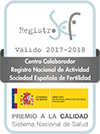
Egg donation or IVF with egg donor is a very common treatment among assisted reproduction techniques which many women can fulfill their dream to become mothers. Even if turning to egg donor process becomes more frequent day by day, it still keeps raising doubts among patients who are going to undergo this treatment. Eva fertility Clinics will help resolving these doubts.
Nowadays, egg donation represents hope for different kind of patients: women over the age of 40, girls affected by premature menopause or ovarian failure, women who lost their ovaries due to endometriosis or cancer in that area, women who were subjected to unsuccessful IVF treatments.
Turning to an anonymous donor can concern patients at a first approach but it should be pointed out that it is a safe and efficient option. Since the 1900s, egg donation has been used as a satisfactory technique for couples who cannot achieve pregnancy in any other way. This procedure has the highest pregnancy rates in the assisted reproduction field, between 40% and 60% per cycle.
Why does egg donation offer high pregnancy rates?
Egg donation offers high pregnancy rates due to many causes such as; the fact that egg donors cannot be older than 30 years old. Egg donors donate egg of high quality which have been previously studied and selected in a comprehensive manner. Consequently, success rates are higher because eggs characterized by certified quality are utilized.
Is egg donation a really safe option?
Egg donation is a really a safe option for patients and the recipient woman who is prepared for the procedure in a simpler way compared to Conventional IVF. The most important thing is to synchronize the recipient’s menstrual period with the donor’s. This can be obtained naturally or through hormone administration which is a more accurate solution. The aim is that by administering the medication, a woman’s endometrium develops as she was naturally pregnant, and preparing the endometrium to receive the embryo.







